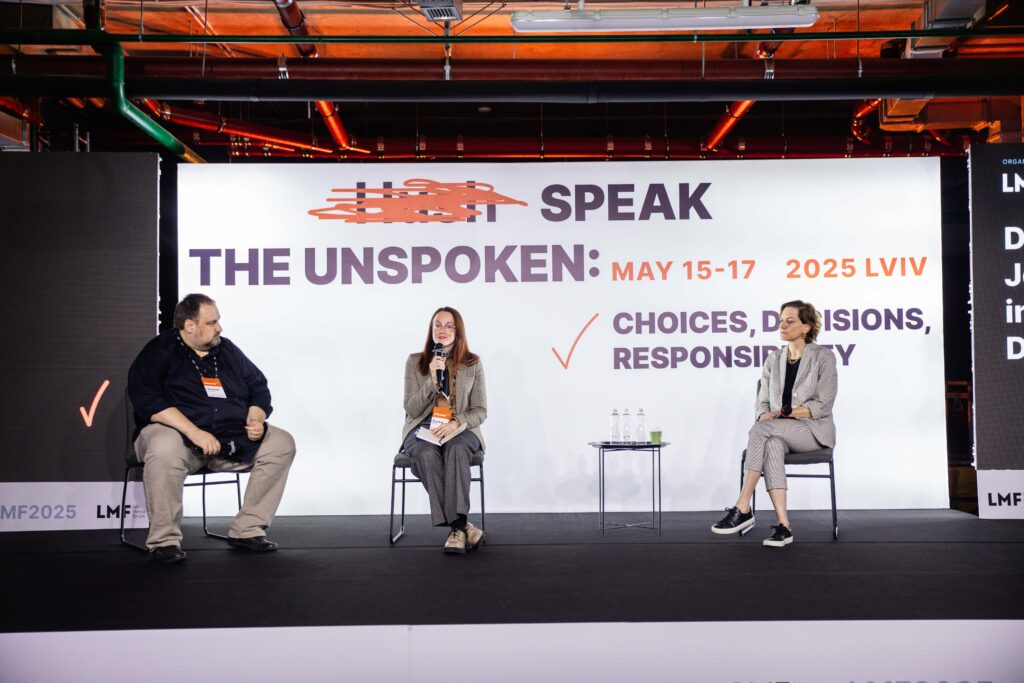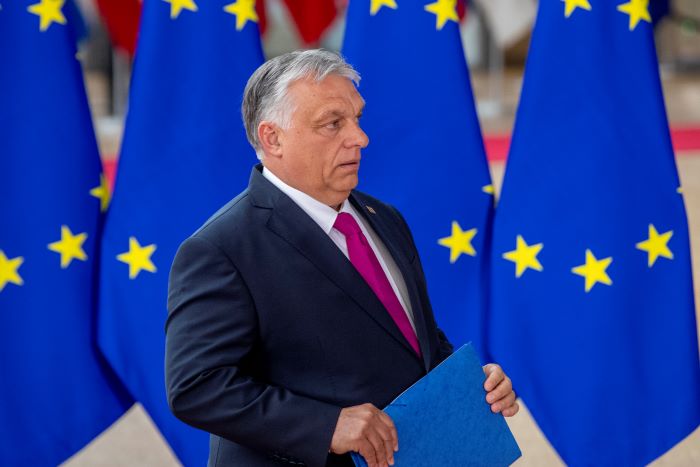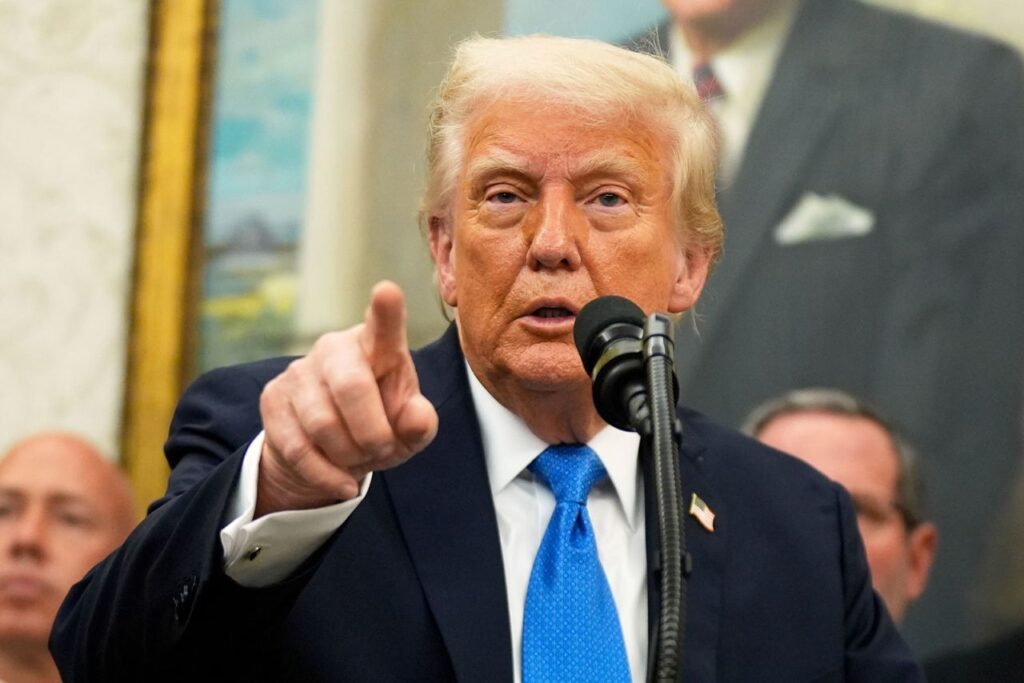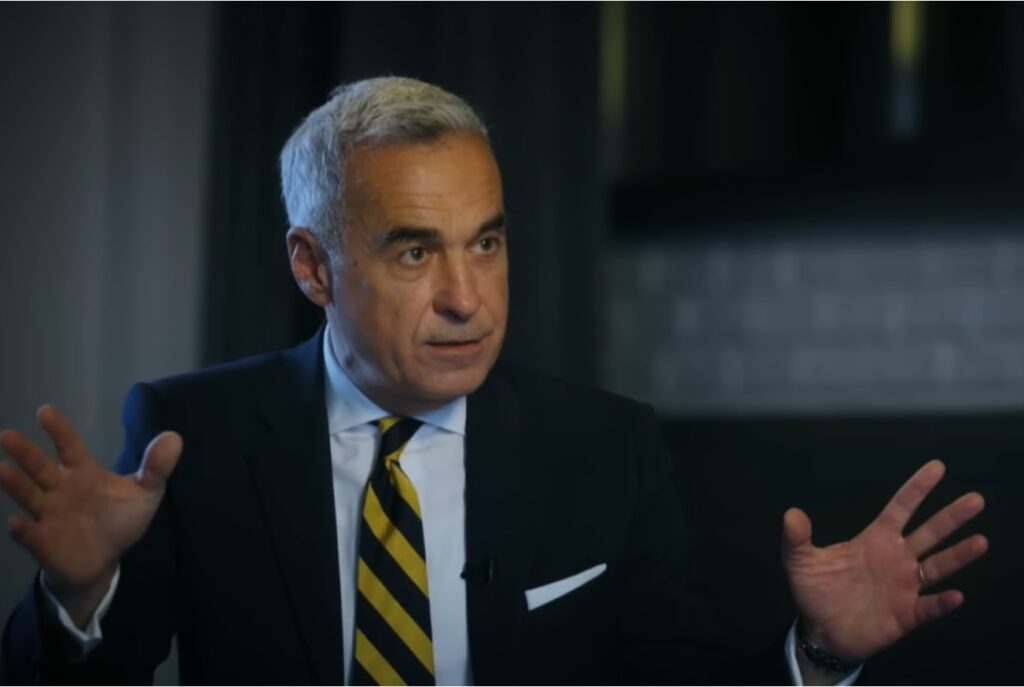Global press freedom is at its lowest since 2002, says Reporters Without Borders. Independent media face pressure worldwide—from authoritarian regimes, economic collapse, and disinformation networks, including Russia’s unchecked propaganda.
At the 2025 Lviv Media Forum, held from 15 to 17 May, Pulitzer-winning journalist Anne Applebaum and disinformation researcher Dorka Takácsy warned that democracy is breaking down not just from censorship, but from the erosion of truth itself. Applebaum described how Trump’s second presidency has filled government with figures hostile to US institutions. Takácsy pointed to Hungary, where Viktor Orbán has silenced independent media through loyalist networks, political purges, and narratives amplified by the Kremlin.
Moderating the panel, Ukrainian media strategist Yevhen Hlibovytskyi added a wartime perspective: Can a country like Ukraine uphold media freedom when public trust falters and international support fades?
Yet a deeper issue cuts across all borders: traditional media is losing the public. While outlets like CNN bleed viewers, independent podcasters and investigators are gaining ground among audiences who see them as more authentic and less compromised. The problem isn’t just propaganda—it’s that people no longer believe the press.
What you’ll learn from this panel:
- How Trump and Orbán are reshaping democracy through revenge, control of institutions, and propaganda
- Why traditional media is losing trust — and what journalists must do to rebuild it
- How rational debate is collapsing under spiritual populism and anti-science politics
- What lessons Ukraine and the EU can draw from Hungary’s media downfall.
Hungary’s media crackdown: How Orbán dismantled independent journalism
Yevhen Hlibovytskyi: When there is an enemy narrative that the government projects onto someone and creates a scapegoat—which, for instance, is currently Ukraine—propaganda messages spread very easily because there is the enormous empire that operates through coordinated messaging.
Dorka Takácsy: We are incredibly impactful. Of course, there are also independent outlets that are doing really great work. They are heroic, under-financed, and struggling, as has happened in other places as well. But obviously, they cannot serve as a counterweight to a large propaganda empire that works with coordinated messages.
Once the foundation of the discourse is established, the public broadcasters will also fall in line. Just imagine if the BBC’s leaders were, one way or another, simply dismissed, and if they happened to be replaced and restructured by the government—it would be quite a scandal, right?
At the moment, if you are a public broadcaster and you go down almost to the regional level, people were replaced. People were dismissed. And it was all very calculated to meet the needs and desires of the government. So there is this entire network of 480 outlets: public broadcasters, radio stations, and all of this. Also, the loyalist media. So altogether, the whole media environment has changed drastically.

Trump’s second term: A government driven by revenge
Yevhen Hlibovytskyi: We’re talking about revenge. The Orbán (Hungarian Prime Minister) who returned was not the same Orbán as before. I think one of the themes of the US elections was that we had Trump as the 45th president of the United States, and it was not that damaging. But now, the Trump administration, as the 47th president, is actually quite different in how it approaches policy and in what it does.
Is revenge something that we should be looking at? Is this an indicator that we should all pay attention to from the perspective of the media or think tanks? Is this a factor?
Anne Applebaum: Leaders who lose power and return often have transformed agendas—look at Orbán, Trump, and Hugo Chávez, who staged a coup, was imprisoned, then came back. Trump’s second presidency was always going to be different after his assault on the Capitol and his election denial, though many Americans underestimated this shift.
Trump’s appeal centers on revenge and resentment—targeting elites, the wealthy, or whoever people blame for their problems. This pattern appears throughout history: 1990s Venezuela, 1930s Germany, the Dreyfus Affair. Politicians who build on anger at chosen elites often succeed.

Inside Trump’s new coalition: Tech elites and Christian nationalists
Anne Applebaum: The key difference is Trump’s coalition. His first term featured relatively mainstream officials from government, military, and business who wanted to improve existing systems. Over four years, he’s attracted fundamentally different people who want to overthrow or radically transform American institutions entirely.
This isn’t traditional conservatism. It includes Silicon Valley tech authoritarians wanting America run like a corporation, Christian nationalists seeking religious rule over secular government, and those wanting to reverse social changes since the 1960s. Trump has elevated long-marginalized figures—vaccine opponents and others outside mainstream professions.
The result is an administration where officials actively dislike the very institutions they now lead—the CIA, healthcare system, and others. You’re witnessing the state being attacked from within. This surprises many, but anyone watching closely over the past four years should have seen it coming.
What journalists must do now: Truth-telling and trust-building
Yevhen Hlibovytskyi: As a former newspaper editor, I’m asking myself: what do I need to make visible for my audience? Should I focus more on theories of change? On resentment? On revenge? On what comes next if basic services like water purification fail?
Anne Applebaum: The main difficulty in journalism now—even at prosperous magazines with many journalists—is that we can’t cover everything. We know about stories we don’t have time or capacity for.
The main challenge is knowing what to prioritize. You could write about vaccines and healthcare, kleptocracy and corruption, foreign policy, or civil rights.
The main job of journalists is, first, to investigate and establish what actually happened, as opposed to what propagandists claim. Second, to build trust with readers. You’re obligated to build a community—through social media, reader clubs, or public events—of people who want to understand what you’re saying.
It’s not enough just to write; you need to actively create trust, because we’re in a moment when the President lies daily on TV. He says gas prices went down when they went up. He claims to have achieved peace between India and Pakistan when the Indian government says he had nothing to do with it.
This constant lying means there needs to be a daily attempt to write truthfully and create bonds of trust with people willing to listen. It’s a very difficult job.

Why journalists failed to spot authoritarian shifts
Yevhen Hlibovytskyi: What this means is that the job description for editors and journalists has become more sophisticated, because you don’t only have to follow the standards and procedures of journalism, but you also have to have expertise in what you’re writing about. You have to see the underwater currents. Is this what the Hungarian media missed?
Dorka Takácsy: If I think back to all the steps that were taken, obviously there were major milestones—the creation of the Media Council and all these things I mentioned were major milestones on this sad trajectory.
But there were also smaller steps that I think we don’t recognize in time. Probably because, just like we see now on the bigger stage worldwide, too many things happen and there aren’t enough journalists. The sector is already underfunded, everyone is overwhelmed, and you can understand that because we are all human.
For such a sector, it’s very difficult to see all the complexity of certain things. But there are definitely external factors too, because in other cases the problems were already visible—not as bad as now, but present. When the problems were big enough, many were reflected in different EU organs and institutions. And the EU was often simply too slow, and when there was political will from the outside, you could flag whatever you wanted, but certain steps were also missed.
Now looking back, it all comes together. Obviously it’s easier now to see the whole trajectory we underwent. But when it was happening, I think we missed it.
From science to suspicion: The fall of rational thinking
Yevhen Hlibovytskyi: Does that mean we’re seeing a kind of religious combat where people don’t understand or apply rational thinking, but just apply what they believe in? This isn’t necessarily about God—it’s about vaccines and whatever. So is this a challenge to rationalism as an approach that was predominant in educational systems, governance, and institutions in the developed world over the 20th and 21st centuries?
Anne Applebaum: Yes. What we’re seeing, not just in the US but in many places, is a challenge to Enlightenment thinking—that there’s a difference between things that are true and not true, that there’s a scientific method that can determine truth, that there are trusted institutions like scientific journals, journalism, and government agencies that can be trusted to at least try to find truth in good faith.
Instead, we find people completely rejecting those things under the banner of “do your own research.” I wrote about this regarding the Romanian election and the candidate Călin Georgescu, who won the first round before the election was banned.

Spiritual politics and anti-science: Leaders who reject facts
Anne Applebaum: Georgescu described himself as a spiritual person anointed by God with special powers. He filmed himself swimming in a lake—it was very cold and snowing outside—saying his belief in God kept him from becoming ill. He also rejected vaccines.
His appeal was anti-rational, not just anti-institutional—anti-science. Robert F. Kennedy Jr., who is now Secretary of Health and Human Services overseeing the CDC, has a very similar anti-rational appeal.
Interestingly, both RFK and Georgescu have expressed pro-Russian and pro-Putin feelings. Georgescu has been openly pro-Russian regarding Ukraine and supportive of Putin. We know he was supported illegally by a social media campaign. I won’t make the same claim about RFK, although—who knows.
There’s a clear, concerted attempt to win over people who no longer trust scientific thinking. There’s a link between that and authoritarian thinking. These things are somewhat vague—I don’t want to draw clear lines—but they are connected.
No truth, no democracy: Why shared facts matter
Yevhen Hlibovytskyi: If you’re talking about the end of the Enlightenment, if we could say so, that means if you’re talking about the lack of efficiency that such an approach would have, then it’s only natural for autocrats to limit competition and preserve themselves with whatever inefficient policies they’re offering. Because otherwise, they would be swept away at the next elections.
Anne Applebaum: The problem is even deeper than that. Democracy itself, especially American democracy, is a kind of Enlightenment project. The idea of democracy is that we created this system with rules, and the rules allow us to have debates about reality. Through those debates, we decide what government policy should be.
So democracy requires some agreed-upon reality. You can have your right-wing or left-wing opinion, you can believe there should be more highways or fewer highways. But you have to agree on the number of highways. You have to have some way of counting them. Once you don’t agree, once there’s no shared reality, then you can’t really have a democratic debate.

The myth of the strongman: Why authoritarians thrive on emotion
Anne Applebaum: The system doesn’t work, and autocracy appeals instead to this deeply irrational idea: “we need a leader who somehow embodies the will of the people”—not through reasoned debate or voting, but because he has emerged from the people and expresses their will.
Trotsky, Lenin, and Stalin used to talk like this. This idea doesn’t belong to the right—Hitler spoke like this, too. The idea that the autocrat has some magical link and makes good decisions just because he somehow represents us—this is anti-Enlightenment, anti-rational, and anti-democratic.
Democracy needs this basis in the real world, or it doesn’t work. If you want to get to the deepest layer, the deepest problem we have today, I think that’s it.
How EU funds helped Orbán hide Hungary’s democratic collapse
Yevhen Hlibovytskyi: My question is about the experience of a country that is in Central Europe, that has been part of the European cultural discourse all along. Was there a lack of sense of urgency?
Dorka Takácsy: Yes.
Yevhen Hlibovytskyi: That, you know, “we are a member of the European Union, nothing bad is going to happen to us because we will be protected one way or another through the instruments of the European Union or NATO or whatever.” Was there a lack of understanding that the house may be on fire?
Dorka Takácsy: Despite anti-Western propaganda, polls show most Hungarians still view the EU positively. But their reasons are purely practical—they can work abroad, cross borders easily, and sometimes receive EU funds. It’s not about values, freedom, or European identity—just pragmatism.
These positive numbers don’t mean Hungarians maintain a European mentality. It’s simply practical appreciation.
When EU cash stops, propaganda fills the gap
Dorka Takácsy: Hungary clearly shows how autocrats mask bad policies through external support. For years, Hungary prospered largely from EU accession and cohesion funds. Even with poor government policies, results seemed favorable because EU money created an impression of success. People tolerated media manipulation and propaganda because they felt economically secure.
That magic is now broken. The EU has frozen most funds for two years, exposing the true quality of Hungarian policies. Economic and social policies were always poor, but their impact wasn’t felt while EU money flowed. Now the impact is obvious.
When budgets are healthy, autocrats can buy votes with direct payments. That’s no longer viable. So the propaganda machine intensifies—amplifying narratives and pouring extra resources into messaging. When you can’t pay for votes, you must amplify the propaganda. That’s exactly what we’re seeing now.
Why US opposition to Trump remains muffled
Yevhen Hlibovytskyi: What I can’t understand from the outside is this disconnect: I read excellent articles in The Atlantic and New York Times opinion pages, but I don’t see real urgency in the opposition. There’s no visible concern even within the Republican Party itself. It’s just “Okay, this is happening, we don’t like it”—but no sense of emergency.
Is this hidden from view due to media optics, or does the American system simply work differently than we expect?
Anne Applebaum: There are two key points. First, this isn’t a parliamentary system—there’s no single leader of the opposition and won’t be. Asking “who’s the leader?” reflects an authoritarian mindset. There will eventually be another presidential candidate, but until then, no single leader. That’s not how our system works.

Fear and intimidation: Why GOP critics backed down
Many people are involved—Congress members, senators, local officials, media figures, podcasters. Alarming content exists constantly. If you’re on the right Instagram algorithm, you’ll see it; if not, you might miss it. There’s significant activity happening. You’d need to follow specific people to see more. Nationwide protests have occurred, with groups planning regular ones.
Second, people are angry at Democrats for not stopping Trump, but they lack the tools. Without control of Congress, there’s no way to prevent executive actions. They can’t physically stop what’s happening.
Much of what Trump has done is illegal. Cases are moving through courts now, and I expect courts will begin blocking actions. Then we’ll see an interesting moment—will the Trump administration try to overrun the courts? We’ll find out.
Within the Republican Party, there’s a strange dynamic. Some opposition exists, with many uncomfortable Republicans. But something not understood from outside—many Republican politicians are physically scared. They worry that voting against the president means facing physical attacks at home or their children being harassed at school. This is new in American politics over the last four years.
With widespread firearms, people are genuinely frightened. Many Republicans left Congress for this reason. Most who voted for Trump’s impeachment are gone—either forced out like Liz Cheney or they quietly departed.
How polarized media killed neutral journalism
Yevhen Hlibovytskyi: Is CNN being the preferred Democratic voice and Fox News being the preferred Republican voice? Is this the end of independence? Are we going into pluralism as an alternative, or is editorial independence still a value that is still being pursued or should be pursued?
Anne Applebaum: First, CNN isn’t the voice of the Democratic Party at all. CNN has tried to do something different, which isn’t quite working. But CNN, Fox, and MSNBC—ten years ago, all these networks had more editorial independence than now.
They used more neutral tones and presented discussions more neutrally, but that was also because we lived in a less polarized moment when people were less angry.
The business of bias: Why neutral news can’t survive
Anne Applebaum: The business model now for much of media is appealing to your base. You make money by building a base and appealing to one partisan segment of the population. The neutrality business model, designed to appeal broadly, has mostly failed.
When I started in journalism, The Washington Post was essentially the only newspaper in Washington. The Post had an interest in appealing to a wide readership—it wanted Republicans and Democrats to read it, and local businesses to advertise. It was like a monopoly—someone described it to me as a public utility, like the gas company.
That’s not true anymore. There’s no business model where you win over a broad swath of people with neutral commentary. You’ve had this siloing of newspapers and TV. No, it’s not good. Some things were gained—the neutrality sometimes concealed laziness or refusal to be clear. There were things lost in that earlier period we don’t miss.
But the partisan role has been dictated by the business environment.

Can public broadcasting save democracy?
Yevhen Hlibovytskyi: One unconventional thing we have in Ukraine is a strong public broadcaster (Suspilne). Is a public broadcaster a potential source of stabilization for the entire media market? Is it important to have an independent public broadcaster for private media to thrive and be less dependent on niche, ideological platforms?
Anne Applebaum: If you can have it—and as Hungary proves, it’s very easy to undermine an independent public broadcaster if you don’t have good laws—but if you can have it and it’s able to build wide trust, something like the BBC (though even the BBC has lost trust in recent years), then it is one of the things that can keep politics centered.
Even the fact that the BBC—it’s a little bit fake, but during election campaigns they insist every political program has a member of each party on a panel—is really useful. You don’t have that on Fox News. Having somebody legally obliged to at least try to be neutral can be extremely important.
Of course, we don’t have this in the United States at all. We have a sort of public broadcaster, but it’s very niche and not even fully government funded.
Dorka Takácsy: Yes, it’s absolutely vital, because otherwise look at what happens if you don’t have a real public broadcaster. It’s not the only source of problems in Hungary, but it’s clearly an indicator that something is wrong.
Unfortunately, we live in an era where polarization is extremely important. This creates a vicious circle because media outlets need to survive, and it’s easier to appeal to emotions. The center is slowly becoming more radical on both sides, and this kind of news further increases polarization.
If you can have a public broadcaster that can afford not to go for emotions—to be dry and professional, though probably less interesting than outlets that live purely from the market—then you have to preserve it, because there’s chaos all around.
Ukraine’s future: Build democracy for yourself, not the EU
Yevhen Hlibovytskyi: We’ve been discovering how bad the situation is in our neighboring areas, and there might or might not be a light at the end of the tunnel. But considering that Ukraine is still trying to Euro-integrate, and seeing the dissolution of institutions in the US and many European countries… Are we screwed?
Anne Applebaum: No, no. I think the answer is that you should democratize Ukraine and build institutions there not to get into the EU or to someday be accepted into NATO. You should do it because it’s good for Ukraine.
Following the lead of other countries or seeking to appeal to them—you’re not going to appeal to them. That’s a fool’s game. There’s no point to it.

Will Europe stand by Ukraine? Why support still matters
Yevhen Hlibovytskyi: Without an international network of support—considering that we are at war, the challenges we have, the pain inside Ukrainian society—we’re actually at risk of not having sustainable democracy. Not because we cannot sustain it as a society, but because we cannot sustain it as a society in these circumstances. How reliably should we expect external support for the cause of democracy and freedom in Ukraine?
Anne Applebaum: I can’t tell you what will happen in the distant future. Current European leaders strongly support Ukraine. There’s a fantastic photograph of your president, President Macron, the German chancellor, and the Polish prime minister all standing in a row, talking and looking happy and friendly. I think that was real.
Among that group, there’s a commitment to Ukraine—to Ukraine’s sovereignty and democracy. Germany has exceeded spending limits to buy weapons—unprecedented for them. You have genuine friends in Europe, plus supporters in the US Congress, public, and business community. Don’t count the US out yet.
Dorka Takácsy: I’m not pessimistic. Ukraine has shown tremendous strength, and we can see clear examples of what to avoid. The support is there, especially with current EU leadership.
They see the bad examples too. Take Hungary—I can say with confidence that the EU is slowly but surely finding its way. Yes, many problems should have been solved earlier, and they don’t always see future consequences in time. But now we clearly see that at many levels, the EU has started recognizing the problems and is growing stronger.
This is encouraging for Ukraine. We can really benefit from this strengthening.
Yevhen Hlibovytskyi: Well, part of adult life is knowing that not all questions will be answered.



